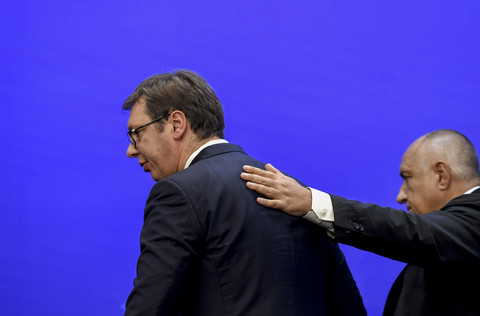[ad_1]

The US, German, and French governments should stop pushing Kosovo’s new leaders into a dangerous deal with Serbia, which risks creating a mess far worse than Bosnia in the region.
US president Joe Biden’s administration and some EU leaders do not seem to have learnt the lesson of the 1995 Dayton Agreement on Bosnia and Herzegovina (BiH), put in place by their predecessors.
The Dayton deal created two entities in a Bosnian federation, but it was not a lasting solution.
It showed that Bosnia’s problems were deeper rooted than believed and it has brought it to the edge of break-up.
Officials on both sides of the Atlantic admit they made a mistake in accepting the division of Bosnia into two entities with veto powers.
The US and EU are now trying to make constitutional and electoral-law changes to strengthen Sarajevo’s central institutions, in a bid to correct those errors.
But when it comes to Kosovo, the very same US and EU officials are naively embarking on the creation of a second Bosnia, by pressuring Pristina to cede special powers to a Serb-minority entity – the Association of Serb Municipalities (ASM).
Washington, Berlin, Paris, and Brussels are pushing Kosovo’s leaders to create an autonomous ASM to rule 10 Serb-majority regions.
And in doing so, they are dancing to the tune of threats and blackmail by Serbia’s nationalist and Russia-friendly president Aleksandar Vučić.
It was Vučić who, earlier this year, tried to unnerve the EU by comparing Kosovo to the Nagorno-Karabakh conflict, where Azerbaijan ended the “status-quo” by lethal force.
And it is Vučić, the former chief propagandist of Slobodan Milošević, who is putting on almost daily shows of aggression, such as his recent military drills with Russian-bought missile systems and warplanes.
He knows how much the EU fears instability in the Western Balkans, because it has to pay the bill, in terms of post-conflict aid and refugees.
And the US and EU capitals are falling for it all, by leaning on Kosovo to make concessions for the sake of peace.
The first steps of this mistake were already made in 2013 and 2015, when Vučić got what he wanted from former Kosovo prime ministers Hashim Thaçi and Isa Mustafa – signed promises of the ASM.
But creating a new independent entity on ethnic grounds in Kosovo risks opening a Pandora’s box in the region.
It could trigger claims for autonomy by ethnic minorities in North Macedonia, Montenegro, and Serbia, on top of aggravating Bosnia’s chronic instability.
There are already calls for it by Albanians in Serbia’s Preševo Valley and Sandzak regions.
The idea of creating the secessionist Albanian entity of Ilirida could resurface in North Macedonia.
This is the wrong path to follow.
The EU should instead continue Serbia’s accession talks, while helping Kosovo to clean up its internal mess on rule-of-law.
It should encourage Western companies to invest in Kosovo, which is the least developed country in Europe, and to create jobs, as they are doing in Serbia.
Only at a later stage should the EU and the US ask Kosovo to discuss its future relations with Serbia – as two independent states and equal parties at the negotiating table.
EU veto
And in the meantime, the 27 EU member states should liberate their wonderful enlargement project from the shackles of veto powers.
The EU treaty in its current form is holding back the aspirations of hundreds of millions of Europeans for a better place to live, as well as causing frustration in the six Western Balkans EU-hopefuls.
Look at North Macedonia, how Greece used EU veto politics to force it to change its name, for nothing in return.
Bulgaria is now doing the same to force it to rewrite its history books.
Who can even guarantee to Kosovo that if it signed a painful compromise with Serbia, the EU-5 non-recognisers (Cyprus, Greece, Romania, Slovakia, and Spain) would change their mind?
“No one can guarantee it”, Miroslav Lajčák, the EU mediator in ongoing Kosovo-Serb talks, said earlier this year.
Indeed, imagine a scenario in which Serbia joined the EU before Kosovo limped in.
How would Belgrade behave toward Pristina when it got its hands on the EU veto stick?
What kind of ASM powers would Serbia then push for?
How long before we saw a second Republika Srpska where parts of Kosovo used to be?
In this context, the EU and US should stop harassing Kosovo with promises they cannot keep.
And they should stop falling for Vučić’s sabre-rattling with Russian missile systems or Chinese drones.
EU alternatives
If it wants to help the Western Balkans, the West should instead focus on containing Russia – the main sponsor of Serbia’s new nationalism.
If it can create a modus vivendi with Russian president Vladimir Putin that genuinely curbs his aggression in Europe, it will make Vučić a much better neighbour to deal with.
Meanwhile, building a lasting architecture of stability in the Western Balkans will take a long time.
EU accession is the best way for people there to reach their dream – the same quality of life as the rest of Europe.
But until some of these deep-rooted problems are resolved, perhaps Kosovo and North Macedonia should explore other options in their EU relations, instead of being forced to cave in to Serbia or Bulgaria’s nationalist demands?
Some 15 years ago, German chancellor Angela Merkel suggested a “privileged partnership” for the region as an alternative to full EU membership.
Iceland, Norway, and Switzerland are doing well without being in the EU. The UK survived Brexit.
If the EU can guarantee nothing, as its negotiator Lajčák said, then perhaps Western Balkan states should also cede nothing in return for now.
[ad_2]
Source link